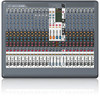Behringer XENYX XL2400 Brochure - Page 3
Talking back, listening up, The back story, Take On The World - 24
 |
View all Behringer XENYX XL2400 manuals
Add to My Manuals
Save this manual to your list of manuals |
Page 3 highlights
Page 3 of 8 XENYX XL3200 XL2400/XL1600 The MAIN A section lies in the bottom right section of the board. It gives you a channel fader (light grey); a 13-LED master level meter in the top right corner gives you a dynamic visual gauge of overall output; a MUTE switch (red) mutes all input channels except CD/TAPE inputs; and a BAL control (black) adjusts the mix of the left and right output signal before they are routed through the MAIN A output. Above, you'll find the MAIN B section, which governs the signal sent through the MAIN B outputs on the back panel. Use the MAIN B section and outputs to connect to a separate power amplifier and multiple loudspeakers, or to a stereo recording system. Talking back, listening up The XL series features a Talkback section in the upper right corner with its own XLR input, LEVEL control (red), and switches that allow you to send its signal to either the MON, AUX, GROUP or MAIN outputs. Finally, a pair of headphone outputs at the top of the board allows you to personally monitor your mix, and a pair of BNC lamp outputs ensures you'll never have to mix in the dark. The back story The back panel of XL series mixers features an intuitive patch bay that gives you tons of flexibility in configuring a live show. In the upper left corner you'll find the MAIN OUTPUTS section. There's left and right XLR outputs for connecting to PA speakers, as well as dual ¼" inserts for connecting a dynamics processor or equalizer to further tweak the main signal. There's also dual OUT B jacks governed by the MAIN B dial on front. Next door to the MAIN OUTPUTS section is the FX/MON/AUX SENDS section. The FX 1 and FX 2 ¼" outputs send signal to outboard effects processors. MON 1 and MON 2 XLR outputs send signal to monitors, and AUX 1 and AUX 2 XLR outputs can be used for either effects processors or monitors. The next section to the right contains the AUX RETURNS. Stereo AUX inputs 1 & 2 allow you to connect more effects processors or submixers, while stereo FX 1 & 2 returns accept processed signals sent from the FX 1 and FX 2 outputs. Each subgroup has its own INSERT and OUT ¼" jacks. The inserts allow you to connect noise gates, compressors or equalizers, while the OUT jacks send the subgroup signal to, for example, a multi-track recorder. Along the bottom of the back panel, you'll find the mono and stereo channel inserts. Mono channels feature both a ¼" and XLR input, as well as an INSERT jack for applying outboard equipment and a DIRECT OUT jack for sending signal to a device such as a multi-track recorder. Stereo channels feature a single XLR input and dual ¼" inputs. Take On The World Not every town on the planet uses the same voltage common in yours. Unfortunately, this sometimes doesn't occur to jet-setting sound technicians until they're 5,000 miles from home. With the XL series mixers, this is never an issue. The internal autorange power supply can run on anything from 100 to 240 V with noise-free audio, top-quality transient response and low power consumption. Left and right SPEAKER ¼" outputs allow you to connect monitor speakers that provide the same signal as the headphone outputs. ¼" INS jacks for dynamics processors or equalizers XLR main outputs XLR OUT B outputs ¼" FX 1 & 2 outputs Balanced XLR Monitor outputs ¼" AUX returns ¼" ouputs for monitor speakers ¼" Subgroup INS for compressors, etc., and ¼" Subgroup OUT to recording device ¼" DIR(ect) OUT Insert I/O for signal processing on individual channels (pre-fader, preEQ and pre-aux send) ¼" TRS balanced/ unbalanced input Phantom power switch Balanced XLR AUX 1 & 2 outputs RCA CD/TAPE IN/OUT Left and right balanced/ unbalanced line level ¼" TRS inputs 8/16/24 Mono channels, each with balanced XLR In with XENYX mic preamp and phantom power for condenser mics











